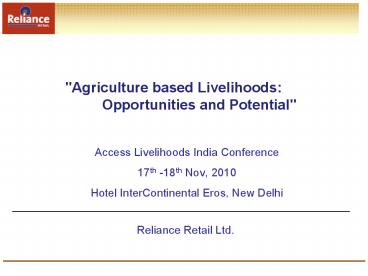Reliance Retail Ltd. - PowerPoint PPT Presentation
1 / 12
Title: Reliance Retail Ltd.
1
"Agriculture based Livelihoods Opportunities
and Potential" Access Livelihoods India
Conference 17th -18th Nov, 2010 Hotel
InterContinental Eros, New Delhi
- Reliance Retail Ltd.
2
Reliance agri supply chain
- Reliance Retail created a farm to fork supply
chain for fresh fruits vegetables. - Developed base with growers
- Retail operations spread across country
- Handling of all fruits vegetables
- Different supply chain models as per product
need
3
Reliance banana supply chain
- Established robust end to end supply chain for
banana - Inclusive business model Co-opting the entire
agri value chain - Also caters to external customers
- Developing upon the strength of existing
channel partners - Reduce post harvest losses ,improve quality ,
better market access - Profitable business proposition - scalable and
sustainable model - Win-Win situation - enhanced value to
growers, customers and the company
4
Traditional Supply Chain
- Harvested in looms
- Transported loose
- Maturity stage based on distance travelled
- Finances growers
- Arranges loading and transportation
- Charges commission and cost incurred to growers
- Auctions in mandi
- Finances consolidators
- Extends credit to buyers
- Charges commission and recovers advances cost
- Uses unscientific practices for ripening
- Extends credit to retailers.
- Also owns push carts
- Gets known people from villages to operate them
- Gives a price band to sell
- Operator makes up for any loss
- They get fixed amount per day paid as lump sum
amount when leaving for home-town
- Poor quality.
- Low shelf life
- Often sold at mark-down price
5
Traditional Supply Chain
Village auction
Conventional ripening
Loader standing on loom
Poor quality for customers
Loading of loom
Loose transportation
6
Drawbacks Traditional Supply Chain
- Many intermediaries - adding costs but little
value addition - No ownership of produce quality - No effort
channelized towards reducing losses - Once harvested, farmer is at the mercy of traders
- More than 30 of produce in the value chain
becomes unsalable - Waste handled in city unhygienic environment
and additional cost - Financial value loss passed onto grower , quality
value loss passed onto consumer - Poor shelf life
7
Reliance Value Chain
Growers
Company appointed vendors
Company owned ripening facilities
Distributors/ Retailers
Consumers
- Buying directly from field
- Fixed farm gate price
- Payment linked to quality
- Secured payment
- Trained on post harvest handling
- Simple infrastructure/ gadgets to follow
practices. - Fixed logistics cost per Kg
- Payment on quality quantity received at
company - Weekly indent
- Scientific ripening under controlled condition
- Quality check of green fruit
- Control of dump, shrink and transit loss of each
consignment. - Dispatch quality check
- Purchases at fixed price from company
- Price as per quality
- Daily supply as per requirement ensures fresh
stock available for customers. - Training on fruit display handling
- Retailing losses reduced with fruit at right
stage of ripeness - Mark-downs minimized due to better shelf life
- Consistent quality with
- better shelf life
- Appreciation of quality offered - willingness
- to pay premium
8
Reliance Value Chain
Transportation in crates
Store display
De-handing
Ripening chamber
Display at pushcart
Washing
Labled banana
9
Reliance Value Chain salient features
- Paradigm shift from trading driven operation to
a value addition based supply chain - Draws on strength of existing players but
transforms role towards improving quality - Purchase price fixed before harvesting
de-risking farmer from market uncertainty - Secured payment to farmer as per commitment
- Right maturity stage harvesting improves
quality of fruit and productivity - Price benchmarked with quality motivates
farmer to adopt practices for improving quality - Tie ups for better planting materials to
improve yield - Developing existing channel partners for
marketing produce
10
Major impact areas
- Improvement in farmers income
- Farmer access to new markets
- Reduction in losses
- Creation of rural employment
- Improved quality to consumer
- Environment friendly
- Benefits of the model enticed unorganized sector
to adopt best practices
Inclusive Innovative Agri model suited to the
local context
11
Key milestones
- Sourcing from 40 banana growing clusters across
the country - Linkages with more than 2000 growers
- Developed 150 plus vendors for procurement
- Marketing in 16 major cities to internal as well
as external customers. - 100 plus distributors organized retailers
12
Thank You!































